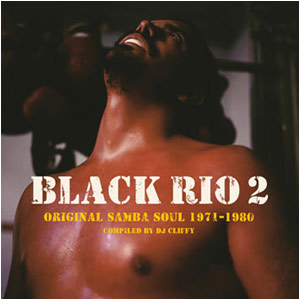
Black Rio 2: Original Samba Soul 1971–1980
Strut
Back in 2002, not too long before beat-centric compilation label Strut closed up shop, DJ Cliffy, of London’s Batmacumba club, put together a volume of samba soul for the imprint titled Black Rio: Brazil Soul Power 1971–1980. Like the label’s post-punk disco compendium, Disco Not Disco, the album made a compelling case for the overlooked strata, with 16 tracks of richly diverse music tied together by an inescapable groove.
Fortunately, last year Strut struck up a partnership with !K7 Records and has taken on its curatorial role once again, which should be given greater appreciation in these overloaded days of instantly accessible music. Once again enlisting Cliffy’s assistance, the label has put together a second volume of Black Rio, this one delving deeper into Tropicalia’s funkier, blacker successor.
While Black Rio volume one featured names like Jorge Ben familiar to even casual fans of Brazilian music, Black Rio 2 gets more obscure, at the same time it presents the varied mutations of the genre. The set starts off with Zeca Do Trombone & Roberta Sax’s “Coluna do Meio” (roughly translated to “column of the way”), a typical hybrid of samba and American soul indicative of the style. Likewise, “Our Sound,” by Guimares e o Grupo Som Sagrado, combines a fast-paced guitar riff with a keyboard whine (think Bernie Worrell) typical of the time. Further evidence of the northern influence comes with the Cry Babies’ cover of James Brown protegee Marva Whitney’s “It’s My Thing.” Here things get a bit harried, with reverb-soaked vocals grinding against horn blasts. Renatu Lu’s “Faz Tanto Tempo” (in English, “it makes as much time”), originally from her self-titled 1971 album, is a similarly potent diversion, with go-go entering the fold for a wild, hard grooving number. Elsewhere, Os Diagonais’ hits a proto-funk fervor that translates well despite the language barrier, while on “Supermarket,” Pete Dunaway goes one step further into disco without losing his native inflections (the accent’s on the fourth syllable in the title).
Perhaps even more than its predecessor Black Rio 2 shows the incredible variation in Brazilian music, even amongst a given style, and the abounding musical heritage of the country. More than those in any other place on the map, Brazil’s musicians were able to take the sounds imported from America and completely absorb them into their lexicon, making the music that emerged, like that on this comp, something completely unique and modern but also informed by indigenous traditions. Of course, a good beat is universal, and this record has that in spades.
Stephen Slaybaugh
PAST PERFECTS
Big Star, #1 Record/Radio City
Mirrors, Something That Would Never Do
Various Artists, Smart's Palace
Miles Davis, Sketches of Spain
39 Clocks, Zoned
Company Flow, Funcrusher Plus
Nick Cave & the Bad Seeds, From Her to Eternity, The Firstborn Is Dead, Kicking Against the Pricks, and Your Funeral... My Trial
Stark Folk, Stark Folk
Dntel, Early Works For Me It It Works For You II
Cocteau Twins, The Pink Opaque
Ray Charles, Genius: The Ultimate Ray Charles Collection
Red Red Meat, Bunny Gets Paid
Chris Darrow, Chris Darrow and Under My Disguise
Beth Orton, Trailer Park
